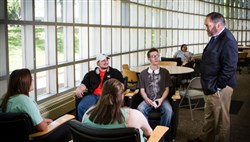VOL. 41 | NO. 23 | Friday, June 9, 2017
4-year schools’ goal: ‘Make sure no one comes up short’
By Joe Morris

Ted Lewis, vice president of Academic Affairs at Pellissippi State Community College, works with students in the Hardin Valley campus’ Goins Administration Building to help advise them with the transfer process. From left: Kelly Howard, who is pursuing a nursing degree, Charlie Garcia, who is studying mechanical engineering, Leanna White, paralegal studies, and Pierce Wender, who earned his associates degree from PSTCC and has now transferred to UT-Knoxville, where he is studying geography in hopes of becoming a middle school social studies teacher.
-- Adam Taylor Gash | The LedgerCommunity college graduates from the Tennessee Promise program are ready to make the jump to four-year campuses, but are the four-year schools ready for them?
And, are the four-year institutions prepared for returning adult students, who under the newly launched Tennessee Reconnect plan get another shot at earning a degree?
“People at all different points in their academic careers can be unsure of what to ask and when to ask it,” says Larry Long, assistant director of transfer admissions for the University of Tennessee-Knoxville.
“We want to talk when they first show up; we want to talk in their last semester. They need to be aware of things specific to certain majors, such as when to get a math or other class done, and what must be done to qualify for other scholarships in some majors.
“Our goal is to make sure that no one comes up short.”
The goal is for anyone who may want to review options focusing on continued degree work – whether fresh out of community college, in need of guidance after years out of school or simply an individual who wants to review options – to find the lines of communication open for a range of questions from financial aid to course requirements and more.
The Tennessee Transfer Pathway, for example, is set up to guide students through taking the work done for an associate’s degree and applying it to a bachelor’s degree.
“We have a transfer counselor who’s more or less stationed in Middle Tennessee, and so we have someone who’s already spending time at Nashville State, Volunteer State, Motlow and Columbia community colleges,” Long explains.
“We have been a regular presence on those campuses, but now we’re really trying to be there even more so we can answer questions students have, as well as build closer relationships with the community college faculty and staff.”
Both public and private institutions have been reaching out to community colleges and technical schools to enhance their on-the-ground efforts in order to capture even more students.
Private school approach
At Lipscomb University in Nashville, a full repackaging and rebranding of some scholarships was done under the Lipscomb Promise program. That should have wide appeal to Tennessee Promise and other potential transfer students even though some students say they believe a private university may be out of reach, says Reggie Blair, director of admissions.
“Our promise and commitment to those students is that they can apply for free if they have graduated or have more than 30 hours of coursework completed,” Blair explains.
“We give them a free transcript evaluation within 72 hours, and review what Tennessee Transfer Pathway is appropriate for them.”
Successful applicants can then tap into a graduating series of scholarships funds. Some will receive $10,000 a year to live off campus, or $12,500 a year if they live on campus.
Those who have an associate’s degree can access another $2,500, and students who achieve membership in Phi Beta Kappa or National Society of Leadership and Success can pull in another $2,500.
“That’s up to $17,500 in institutional aid, and if they are eligible or still using a Pell grant or Hope scholarship, then they can leverage those funds as well,” Blair adds.
“What we’re trying to do is make a private, Christian education affordable and accessible for people who think it may be out of reach.”
Even though the first Tennessee Promise students are just now graduating and evaluating their options, Blair says the early signs point to a lot of interest.
“We recently hosted an event on our campus for community college representatives and others, and we saw a spike in applications as soon as the word of our programs began to get out,” he adds. “We’ve already seen a 15 percent increase in transfers applications from last year to this year, and so we think the groundwork we are putting in has gotten our message out there.
“Once we see the first students come in, we can evaluate what we’ve done and see what else is needed to create a steady pipeline.”
Numbers are up
Going in the other direction, administrators at Nashville State are happy to hear from four-year institutions, notes George H. Van Allen, president, who says that his college and others in the state system have long worked to keep the transfer option alive and well.
“We have very strong transfer agreements with Lipscomb, Belmont University, TSU, MTSU and other schools in our area,” Van Allen says.
“We think many Tennessee Promise students are going to want that four-year degree, and so we’re working to make sure they can capitalize on their two eras with us and then do well at whatever receiving institution they have chosen.”
At Knoxville’s Pellissippi State, a history of success also bodes well for Tennessee Promise students, adds Ted Lewis, vice president for academics.
“We have articulation agreements through Tennessee Transfer Pathways, as well as other plans, with just about every university in the area,” Lewis says.
“About 62 percent of our students already transfer, or about 10,000 people, so it’s important that we make those strong relationships even better if we’re going to see that number continue to rise.”